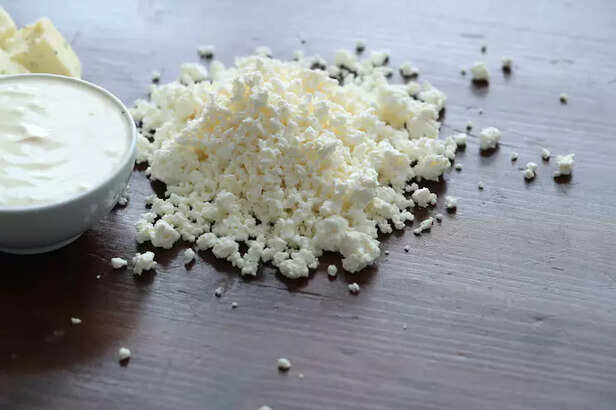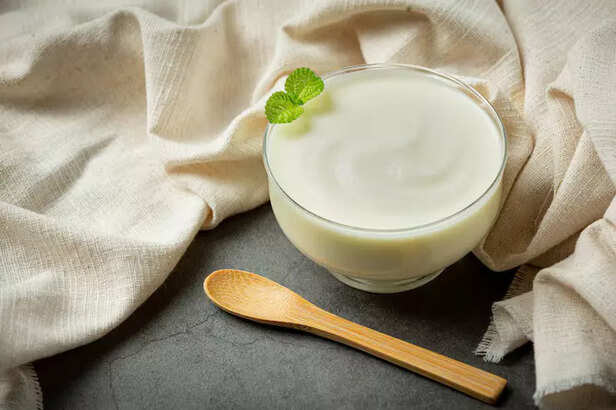Discover the Power of Fermented Foods!
Amritansh Nayak | Jun 04, 2025, 14:15 IST
( Image credit : Timeslife )
Fermented foods are ancient, gut-healthy powerhouses that are more than just trendy. These probiotic-rich staples, which range from curd to kimchi, improve immunity, digestion, and general health. For optimal advantages, learn how they function, which ones to consume, and how to safely prepare them at home.
Health fads come and go in today's fast-paced world, but fermented foods have endured throughout history. These ancient staples, such as Japan's miso, Korea's kimchi, and India's curd, are teeming with good bacteria that are good for your gut and more. Fermented foods are finally receiving the attention they merit because they are supported by science and have deep cultural roots. This article examines their uses, advantages, and safe ways to incorporate them into your regular diet.

Foods that have undergone a natural process whereby microorganisms such as bacteria, yeast, or fungi convert sugars and starches into simpler chemicals like acids, gasses, or alcohol are known as fermented foods. This change improves the food's flavor, texture, and nutritional content in addition to aiding in preservation. Microbial metabolism is the science underlying fermentation. Lactic acid, alcohol, and other chemicals are produced from carbohydrates by beneficial bacteria, mainly Lactobacillus species, and yeasts. This produces an acidic atmosphere that keeps the food fresh by inhibiting dangerous microorganisms. For instance, bacteria in dairy produce curd or yogurt by converting lactose to lactic acid.
Fermentation has been used for ages by various cultures worldwide. Probiotic-rich curd, or dahi, is a daily staple in India. Kimchi, a type of spicy fermented vegetable from Korea, is well-known for strengthening the immune system. While Eastern Europe is famed for its kefir and sauerkraut, Japan employs fermented soybeans to make natto and miso. These traditional foods support digestive health in addition to reflecting cultural heritage. Nature uses fermentation to naturally improve food. Fermented foods have a legitimate claim to a place in our regular meals because of their capacity to enhance digestion, increase immunity, and preserve nutrients.

Trillions of bacteria called the gut microbiota live in your gut and are essential to your general health. These microorganisms aid in the breakdown of complex foods and the absorption of vital nutrients. They have a profound impact on your immune system and even your mental health, so their influence extends beyond your stomach. The body's first line of protection against dangerous pathogens is a healthy gut flora. It also fortifies the immune system and aids in controlling inflammation. The gut-brain axis, a significant link between the gut and the brain, has even been demonstrated by recent study. Anxiety, depression, and mood problems have all been connected to an imbalance in gut flora.
Fermented foods can help with this. They aid in preserving and reestablishing a balanced gut microbiome because they are abundant in probiotics, or live beneficial bacteria. Yogurt, kimchi, kefir, and fermented pickles are examples of foods that introduce beneficial bacteria that improve immunity, ease bloating, and facilitate digestion. It's critical to understand the difference between prebiotics, which are indigestible fibers that nourish these bacteria, and probiotics, which are live helpful bacteria. They work as a potent team to promote intestinal health. A more resilient and healthy digestive system can be achieved by incorporating both into your diet.

Fermented foods have significant health benefits and are simple to include in regular meals. Here are a few well-liked choices to begin with. In Indian homes, curd or yogurt is a basic food. Packed with protein, calcium, and probiotics, it helps calm the body, improves digestion, and fortifies bones. A greater range of probiotic bacteria can be found in kefir, a fermented milk beverage that is thinner than yogurt. It strengthens immunity, promotes gut health, and is particularly advantageous for those who are lactose intolerant. Rich in fiber, vitamins, and antioxidants, kimchi is a Korean meal made from fermented vegetables and spices. It contains anti-inflammatory qualities and aids with digestion.
European fermented cabbage, or sauerkraut, is high in digestive enzymes and vitamin C. It supports the immune system and is excellent for gut health. Probiotics, B vitamins, and healthy acids can all be found in kombucha, a fermented beverage. It increases vitality and aids in liver detoxification. Miso, a fermented soybean paste from Japan, is frequently used in soups and broths and is a fantastic source of protein and good bacteria. In Indian cooking, idli/dosa batter spontaneously ferments. It improves the amount of B vitamins and aids with digestion. In addition to being nutrient-dense, these foods have roots in traditional diets from many countries, particularly in India, where fermentation has long been a common cooking method.
Although fermenting food at home is easy and pleasant, safety is essential to reaping the health advantages without taking any chances. Here are some crucial pointers:
Dos:
In addition to being tasty, fermented foods are a cheap, natural method to improve immunity, gastrointestinal health, and general wellbeing. They should be on your plate every day because they are scientifically supported and have a long history. They are simple to prepare and safe to consume at home with the correct techniques and attention.
Explore the latest trends and tips in Health & Fitness, Travel, Life Hacks, Fashion & Beauty, and Relationships at Times Life!

fermented foods
( Image credit : Timeslife )
How Do Fermented Foods Function and What Are They?
Fermentation has been used for ages by various cultures worldwide. Probiotic-rich curd, or dahi, is a daily staple in India. Kimchi, a type of spicy fermented vegetable from Korea, is well-known for strengthening the immune system. While Eastern Europe is famed for its kefir and sauerkraut, Japan employs fermented soybeans to make natto and miso. These traditional foods support digestive health in addition to reflecting cultural heritage. Nature uses fermentation to naturally improve food. Fermented foods have a legitimate claim to a place in our regular meals because of their capacity to enhance digestion, increase immunity, and preserve nutrients.

healthy lifestyle
( Image credit : Timeslife )
The Relationship Between the Gut Microbiota and Why It Matters
Fermented foods can help with this. They aid in preserving and reestablishing a balanced gut microbiome because they are abundant in probiotics, or live beneficial bacteria. Yogurt, kimchi, kefir, and fermented pickles are examples of foods that introduce beneficial bacteria that improve immunity, ease bloating, and facilitate digestion. It's critical to understand the difference between prebiotics, which are indigestible fibers that nourish these bacteria, and probiotics, which are live helpful bacteria. They work as a potent team to promote intestinal health. A more resilient and healthy digestive system can be achieved by incorporating both into your diet.

prebiotics vs probiotics
( Image credit : Timeslife )
The Best Fermented Foods to Include in Your Diet
European fermented cabbage, or sauerkraut, is high in digestive enzymes and vitamin C. It supports the immune system and is excellent for gut health. Probiotics, B vitamins, and healthy acids can all be found in kombucha, a fermented beverage. It increases vitality and aids in liver detoxification. Miso, a fermented soybean paste from Japan, is frequently used in soups and broths and is a fantastic source of protein and good bacteria. In Indian cooking, idli/dosa batter spontaneously ferments. It improves the amount of B vitamins and aids with digestion. In addition to being nutrient-dense, these foods have roots in traditional diets from many countries, particularly in India, where fermentation has long been a common cooking method.
Consuming Fermented Foods at Home
Dos:
- To avoid contamination, always begin with jars and utensils that have been cleaned and sterilized.
- Use non-iodized salt and filtered or cooled boiling water because additives and chlorine can prevent fermentation.
- To prevent mold formation, keep your fermentation containers in a cool, dark area and make sure all of the components are well submerged in the brine.
- To make tracking easier, mark the date you began fermenting on the jars.
- Metal containers and lids can react with acidic ferments, so avoid using them.
- Jars should not be overfilled since the gasses created during fermentation require space to expand.
- Avoid opening the jar too often in the early stages of fermentation since air exposure can cause problems.
In addition to being tasty, fermented foods are a cheap, natural method to improve immunity, gastrointestinal health, and general wellbeing. They should be on your plate every day because they are scientifically supported and have a long history. They are simple to prepare and safe to consume at home with the correct techniques and attention.
Explore the latest trends and tips in Health & Fitness, Travel, Life Hacks, Fashion & Beauty, and Relationships at Times Life!
